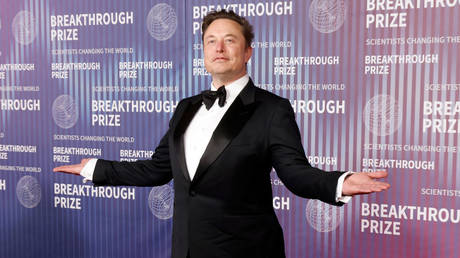The Age of Extremes: Turmoil and Trillionaires” explores the contradictions defining our era — a world where Elon Musk is poised to become the first trillionaire even as nearly 700 million people remain trapped in extreme poverty. This long-form analysis examines how technology-driven super-wealth, widening inequality, and a revival of Cold War–style tensions are reshaping politics, economics, and global security. As military spending reaches an all-time high and a new space-based arms race takes shape, social unrest, populism, and ideological battles intensify. Drawing on reports from Oxfam, SIPRI, and the World Bank, the article argues that these extremes are neither accidental nor sustainable. With billionaire fortunes multiplying while AI wipes out jobs and climate disasters deepen vulnerability, the central question becomes unavoidable: Will the world tolerate an age of trillionaires, or will growing public anger force a rethinking of how wealth, power, and opportunity are distributed?


By Subhash Dhuliya
Humanity stands at a bewildering crossroads. Never has material progress been more dazzling — or more grotesquely unequal. At one end of the spectrum, tech mogul Elon Musk is projected to become the world’s first trillionaire, a milestone that surpasses the GDP of more than 170 countries including Belgium, Switzerland, Denmark, Finland, and New Zealand. At the other end, nearly 700 million people live on less than $2.15 a day, their lives shaped by hunger, conflict, climate shocks, and deprivation rather than innovation.
And Musk will not remain alone at the summit. Billionaire wealth grew three times faster in 2024 than in 2023. Oxfam warns that the world could see at least five trillionaires within the next decade. With the richest 10% owning more than 85% of global wealth, inequality is not only widening — it is crystallising into a global caste system.
What It Means to Live in the Trillionaire Age
To live in an age where a single human being may command more wealth than entire advanced economies is to inhabit a world where the balance of power — economic, political, and technological — shifts sharply away from democratic institutions and toward private actors. Wealth on this scale becomes structural influence, not mere personal fortune.
A trillionaire can shape markets, dictate labour conditions, steer supply chains, and exert pressure on national policies in ways governments may struggle to counter. When one individual controls resources exceeding a nation’s GDP, the boundaries between public and private power blur. Democracies become vulnerable to lobbying, regulatory capture, and monopolistic dominance. Governments unable to tax or regulate super-wealth cannot adequately invest in public goods — health, education, infrastructure, and climate adaptation — the pillars of social stability.
Culturally, the trillionaire era reshapes perceptions of fairness and merit. Economic distances become so vast that social mobility feels impossible and public trust erodes. The arrival of the trillionaire is not just a milestone in wealth accumulation; it is a stress test for democracy, a challenge to economic justice, and a warning that the social contract is being stretched beyond its limits.
A Planet Split in Two
Humanity has always tolerated inequality. But the scale of divergence in the 21st century is unlike anything before. On one side stands Elon Musk; on the other, nearly 700 million people whose condition has barely changed since 1990 despite decades of globalization, technological expansion, and consumer capitalism.
Rockets pierce the edge of space, AI systems generate billion-dollar efficiencies, and supply chains span the globe — yet a vast share of humanity struggles simply to survive. What makes this moment especially disquieting is not the existence of wealth but the unprecedented scale of divergence — what Oxfam calls the rise of “a new aristocratic oligarchy.” Wealth is inherited, shielded, and multiplied through systems that benefit the few while excluding the many.
Over the next two decades, an estimated $5 trillion will pass from one ultra-rich generation to the next, much of it shielded from taxation through loopholes, trusts, shell companies, and offshore havens.
The Poverty Paradox: Stagnation Amid Surplus
Extreme wealth accelerates upward even as poverty remains entrenched. Nearly 700 million people continue to live in extreme poverty — virtually unchanged from 1990.
The World Bank offers one of its bleakest assessments: If current trends persist and inequality does not reverse, it may take more than a century to eradicate poverty.
A hundred years — despite unprecedented wealth, technological capacity, and record-high military expenditure. A global system that creates trillionaires while trapping hundreds of millions in deprivation is not only unjust — it is combustible.
The New Arms Race: Geopolitical Turmoil Returns
Inequality is only one axis of the Age of Extremes. The other is a surge in geopolitical tensions reminiscent of the Cold War — but more technologically potent and far more dangerous.
Three decades after the Soviet Union collapsed, great-power rivalry has returned with a vengeance. But today’s confrontation is unfolding in the one domain with no treaties or limits: outer space.
- The United States has unveiled the Golden Dome, an AI-driven planetary defense system to intercept missiles and hostile satellites.
- China is developing a quantum-enabled security shield built on cyber dominance and rapid satellite deployment.
- Russia, despite economic strain, maintains advanced anti-satellite and electronic warfare capabilities refined through conflict.
Global military spending reached nearly $2.5 trillion in 2024, the highest in human history. Defense corporations flourish, orbital weaponry expands, and nations pour billions into technologies that deliver deterrence but not security — even as their citizens battle inflation, job losses, and climate disasters.
When Workers Earn Pennies and CEOs Earn the Moon
Pope Leo XIV captured widespread moral unease when he observed:
“CEOs who 60 years ago might have made four to six times what a worker earns now make 600 times more.”
His remarks came shortly after Tesla shareholders approved a pay package paving the way for Musk’s trillion-dollar ascent. The sentiment resonates far beyond the Vatican: the economic game feels rigged.
When Inequality Breeds Anger: The Rise of Populist Politics
In a stunning upset, New York City elected Zohran Mamdani — a member of the Democratic Socialists of America — as mayor. His radical platform of rent freezes, free buses, and universal child care ignited a movement. “Tax the rich!” became the rallying cry — once fringe, now mainstream.
A trillion-dollar payday for a tech CEO followed by the election of a socialist in America’s capitalist heartland captures the political contradictions of our time. When economic disparities reach grotesque extremes, the political pendulum swings — often violently.
The Coming Storm: Will People Tolerate Trillionaires?
History offers a clear pattern: when wealth concentrates at the top and opportunity collapses at the bottom, societies reach breaking points.
Warning signs are everywhere:
- AI is eliminating millions of white-collar jobs.
- Housing has become unaffordable in global cities.
- Climate disasters devastate communities.
- Food and energy prices hit record highs.
- Youth unemployment reaches crisis proportions.
Meanwhile, a new class of trillionaires emerges — individuals whose wealth exists on a different moral and mathematical plane. The question is no longer whether people will protest, but when.
The Decency Test: What Trillionaires Owe the World
Whether humanity accepts or rejects the trillionaire age will depend on whether such fortunes benefit society or deepen inequality.
A trillion dollars is not simply capital — it is power: political, technological, cultural. Such power can shape democracies, influence conflicts, direct scientific research, and determine which technologies succeed or fail.
The Question That Will Define Our Future
The Age of Extremes presents a profound paradox. Humanity possesses the wealth, technology, and knowledge to eradicate poverty, prevent wars, combat climate change, and ensure dignified lives for all. Yet we are drifting toward a world with greater wealth concentration, growing geopolitical instability, and millions trapped in insecurity.
The emergence of trillionaires is not merely an economic milestone; it is a moral test.
Will we accept a future where a handful hold more wealth than nations?
Will we tolerate a world where orbital weapons receive more investment than education or healthcare?
Will we remain silent as AI displaces workers and climate disasters escalate?
Or will we demand a more balanced, humane, and democratic global order — one where prosperity is shared, wealth is taxed fairly, and progress is measured not by the number of trillionaires we produce but by the number of lives we uplift?
The Trillionaire Age Is Coming
Ultimately, the Age of Extremes leaves humanity with a stark choice: accept a future where trillionaires tower over nations while millions slip deeper into insecurity, or rebuild a social contract that reins in concentrated power before it corrodes democracy itself. Space-age weaponry and boundless private wealth may symbolize progress, but they also reveal the moral imbalance at the heart of the 21st century.
Unless governments and citizens demand fair taxation, accountable wealth, and investment in human dignity, this era of turbulence will harden into a permanent divide.
The trillionaire age is coming — the only question is whether humanity can still afford its consequences.
References
Global Inequality & Wealth Concentration
Credit Suisse. (2024). Global wealth report 2024. Credit Suisse Research Institute. https://www.credit-suisse.com/about-us/en/reports-research/global-wealth-report.html
Oxfam International. (2024). Inequality Inc.: How corporate power divides our world and the need for a new era of public action. Oxfam International. https://www.oxfam.org/en/research/inequality-inc
World Bank. (2024). Poverty and shared prosperity 2024: Ending poverty in a changing world. World Bank Group. https://www.worldbank.org/en/publication/poverty-and-shared-prosperity
Geopolitics & Military Expenditure
Acharya, A. (2014). The end of the American world order. Polity Press.
Buzan, B. (2010). The invention of international relations theory. Columbia University Press.
Haass, R. (2017). A world in disarray: American foreign policy and the crisis of the old order. Penguin Books.
Karabell, Z. (2012). No one’s world: The West, the rising rest, and the coming global turn. Oxford University Press.
Stockholm International Peace Research Institute (SIPRI). (2024). Trends in world military expenditure 2024. SIPRI. https://www.sipri.org/publications/2024/trends-world-military-expenditure-2024
Technology, AI, and the Future of Work
Brynjolfsson, E., & McAfee, A. (2014). The second machine age: Work, progress, and prosperity in a time of brilliant technologies. W. W. Norton & Company.
Lee, K.-F. (2018). AI superpowers: China, Silicon Valley, and the new world order. Houghton Mifflin Harcourt.
United Nations Conference on Trade and Development (UNCTAD). (2024). Digital economy report 2024. UNCTAD. https://unctad.org/publication/digital-economy-report-2024
Social Movements & Democracy
Klein, N. (2007). The shock doctrine: The rise of disaster capitalism. Metropolitan Books.
Piketty, T. (2020). Capital and ideology. Harvard University Press.
Stiglitz, J. E. (2012). The price of inequality: How today’s divided society endangers our future. W. W. Norton & Company.
About the Author
Prof. Subhash Dhuliya is a distinguished academician, researcher, and educational administrator. He served as Vice Chancellor of Uttarakhand Open University and Professor at IGNOU, IIMC, and CURAJ. Earlier, he worked as Assistant Editor and Editorial Writer with the Times Group- Sunday Times and Navbharat Times, and as Chief Sub-Editor at Amrit Prabhat (Amrita Baza Patrika Group) . He has edited IIMC’s research journals Communicator and Sanchar Madhyam, founded Newswriters.in, and served as a UNESCO consultant for journalism education in the Maldives.



